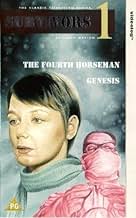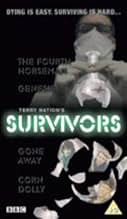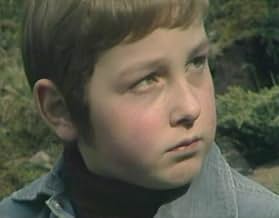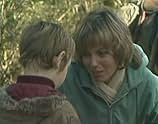VALUTAZIONE IMDb
8,0/10
1553
LA TUA VALUTAZIONE
Una comunità di sopravvissuti lotta per rimanere in vita sulla scia di una pandemia globale nota come la Morte che ha spazzato via il 99,98% dell'umanità.Una comunità di sopravvissuti lotta per rimanere in vita sulla scia di una pandemia globale nota come la Morte che ha spazzato via il 99,98% dell'umanità.Una comunità di sopravvissuti lotta per rimanere in vita sulla scia di una pandemia globale nota come la Morte che ha spazzato via il 99,98% dell'umanità.
Sfoglia gli episodi
Recensioni in evidenza
Survivors is a show about the aftermath of a deadly plague. The title of the show indicates the plague originated in a lab in the Far East, and was accidentally released after a beaker was dropped. Air travel helped the flu-like disease spread around the world quickly and wipe out most of the population.
In England scattered survivors of every age, race and creed band together in small communities, learning to become self sufficient. The survivors often discuss the future, struggling to preserve a sense of normality and trying to plan ahead for building a new world.
This series was created by Terry Nation, better known as the creator of Doctor Who's most deadly enemies the Daleks. I suspect Terry Nation got a lot of his inspiration from such books as Earth Abides and The Day of the Triffids. Particularly the parts about new societies. I've only seen the first series of this show. It was made the year before I was born. Apparently after the first series it started to go downhill, as writers were running out of ideas. Terry Nation was unhappy with the path the show was taking and disowned the later episodes. I think he wanted an ending more like Earth Abides, where post-plague society slips into primitive illiteracy.
Survivors is popular enough to have its own website, created by fans of the show. It has some interesting discussions and speculation about what it would be like to live in the post-apocalypse world, and recommends books with the same theme.
In England scattered survivors of every age, race and creed band together in small communities, learning to become self sufficient. The survivors often discuss the future, struggling to preserve a sense of normality and trying to plan ahead for building a new world.
This series was created by Terry Nation, better known as the creator of Doctor Who's most deadly enemies the Daleks. I suspect Terry Nation got a lot of his inspiration from such books as Earth Abides and The Day of the Triffids. Particularly the parts about new societies. I've only seen the first series of this show. It was made the year before I was born. Apparently after the first series it started to go downhill, as writers were running out of ideas. Terry Nation was unhappy with the path the show was taking and disowned the later episodes. I think he wanted an ending more like Earth Abides, where post-plague society slips into primitive illiteracy.
Survivors is popular enough to have its own website, created by fans of the show. It has some interesting discussions and speculation about what it would be like to live in the post-apocalypse world, and recommends books with the same theme.
The iconic opening sequence of this wonderful show was something I have never forgotten and, unlike many other series from this period, I actually have the three season box set on DVD and have watched it recently and - barring a few obvious age related issues - can confirm it is as good as it initially seemed back in 1975.
The post-apocalyptic mood is brilliantly captured and although the plot and stories do dip after Terry Nation gave up full control of the project, the sense of loss and foreboding is superbly carried forward.
The absence of one of Series 1 leading characters in series 2 and 3 is managed to reasonable effect although it is obvious the writers would have preferred to have carried on from where Season 1 left off. The attempts to shoehorn the missing person's back into the show from time to time is an obvious issue. Also, there are some plot lines that don't entirely work but 'Survivors' is really about characterisation and how you relate to these people in this world. Barely an episode goes by when the viewer doesn't wonder what they would do if it were them in the situation and this adds to the feeling of belonging and care for the survivors - it also adds to the sense of fear and desperation for the viewer.
As you'd expect, the age of the show does leave some reservations and some of the stories would never make the cut now - undoubtedly it is dated, of course - but it also has to be said that the slow pace and different requirements of mid-70's TV actually enhance some aspects with regard to tension and plot building. When they tried to recreate and update the show later, the increased pace and need to make sure something was happening all the time detracted from the atmosphere and understanding of the characters. In the original, you care about the people and what happens to them. There is never any point you don't believe in this post-apocalyptic world and this is the show's strength.
Some detractors have mentioned specific story lines where people don't behave as we'd expect them to do with second decade 21st Century glasses on. This is difficult to argue but, like listening to an old record from the same time, it is a pointless exercise to bemoan the different production values or to miss a modern trope. This is of its time, of course, but it shouldn't detract from the project. Don't forget, when they tried to remake it and modernise it, it was truly awful.
For anyone with an appreciation of classic TV and good story-telling this is highly recommended.
The post-apocalyptic mood is brilliantly captured and although the plot and stories do dip after Terry Nation gave up full control of the project, the sense of loss and foreboding is superbly carried forward.
The absence of one of Series 1 leading characters in series 2 and 3 is managed to reasonable effect although it is obvious the writers would have preferred to have carried on from where Season 1 left off. The attempts to shoehorn the missing person's back into the show from time to time is an obvious issue. Also, there are some plot lines that don't entirely work but 'Survivors' is really about characterisation and how you relate to these people in this world. Barely an episode goes by when the viewer doesn't wonder what they would do if it were them in the situation and this adds to the feeling of belonging and care for the survivors - it also adds to the sense of fear and desperation for the viewer.
As you'd expect, the age of the show does leave some reservations and some of the stories would never make the cut now - undoubtedly it is dated, of course - but it also has to be said that the slow pace and different requirements of mid-70's TV actually enhance some aspects with regard to tension and plot building. When they tried to recreate and update the show later, the increased pace and need to make sure something was happening all the time detracted from the atmosphere and understanding of the characters. In the original, you care about the people and what happens to them. There is never any point you don't believe in this post-apocalyptic world and this is the show's strength.
Some detractors have mentioned specific story lines where people don't behave as we'd expect them to do with second decade 21st Century glasses on. This is difficult to argue but, like listening to an old record from the same time, it is a pointless exercise to bemoan the different production values or to miss a modern trope. This is of its time, of course, but it shouldn't detract from the project. Don't forget, when they tried to remake it and modernise it, it was truly awful.
For anyone with an appreciation of classic TV and good story-telling this is highly recommended.
Survivors is the first post doomsday drama on British television, echoing the pessimistic world view of 70s science fiction feature films such as The Andromeda Strain, The Omega Man or Planet of the Apes. Of course Survivors obviously also owes a lot to the grandmaster of British Science Fiction, John Wyndham with some dialogues almost verbatim taken from the day of the Triffids. But that does not have an impact on the quality of the programme. Like in Romero's Crazies the bureaucracy just fails terribly and the world becomes overrun by a deadly virus. Helpless attempts at stopping it are made but it all ends with a whimper. So a group of survivors from all different walks of life meet and group together. The disaster brings out the best and the worst in people: the hamprered housewife turns into a leader, the leader into a fascist and a rich woman into the bitch from hell. So a lot of the drama comes from the dynamics between the people and all the dilemmas you face in this situation. For viewers of todaya it takes a while getting used to the much slower pace of narration of the 70s. Long scenes, no hand camera and sparingly used music. That makes it look dated but once you accept it, it really makes very good viewing because the pace matches the helplesness of the people. Theonly drawback for me is that as with a lot of 70s and especially 80s British TV the outdoor scenes and the studio scenes were shot on different material so that as a viewer you experience really harsh differences in term of the picture.
A plague wipes out 99-point-something percent of the human race and the survivors have to start again from scratch. The quality of the episodes varies but for me it was never less than good and I'd really put the best ones up there with 'I, Claudius' and the original 'Upstairs Downstairs' at the very peak of classic British TV drama - most notably an episode from the first series revolving around capital punishment and one from the third that's like a cross between a western, a horror movie, The 39 Steps and a Breughel winterscape, with philosophical interludes.
It does have flaws. Some interesting characters are written out too soon, and series stars left without their characters being written out, leading to that unsatisfactory situation I remember from other 70s shows where there are rumours of sightings of them and hints that they may return eventually.
Personally I liked that there was a mix of different types of stories, from adventure to character clash to ideas-based to ones based around technical ingenuity and the resolution of simple problems of coping without infrastructure, even that in the second series there were episodes or portions thereof that were almost idyllic where the major conflict was competing visions of the future. Most of the core characters were middle-class, old-school British, optimists, can-do types, planners, builders, and their belief that they could pull things together again, determination to make the best of things, even excitement at the chance for a fresh start helped make things bearable. But there's plenty of tension, menace, challenge, it's downright harrowing at times, and the deprivations the survivors undergo are a salutary lesson in not taking for granted all the things you tend to. I remember the relish with which I ate an egg after watching an episode where they're an incredible luxury.
If you like (surely the wrong word) John Wyndham's apocalypses or are fascinated by Robinson Crusoe daydreams of 'What would I do if...?' this is especially for you. Avoid the remake like the plague.
It does have flaws. Some interesting characters are written out too soon, and series stars left without their characters being written out, leading to that unsatisfactory situation I remember from other 70s shows where there are rumours of sightings of them and hints that they may return eventually.
Personally I liked that there was a mix of different types of stories, from adventure to character clash to ideas-based to ones based around technical ingenuity and the resolution of simple problems of coping without infrastructure, even that in the second series there were episodes or portions thereof that were almost idyllic where the major conflict was competing visions of the future. Most of the core characters were middle-class, old-school British, optimists, can-do types, planners, builders, and their belief that they could pull things together again, determination to make the best of things, even excitement at the chance for a fresh start helped make things bearable. But there's plenty of tension, menace, challenge, it's downright harrowing at times, and the deprivations the survivors undergo are a salutary lesson in not taking for granted all the things you tend to. I remember the relish with which I ate an egg after watching an episode where they're an incredible luxury.
If you like (surely the wrong word) John Wyndham's apocalypses or are fascinated by Robinson Crusoe daydreams of 'What would I do if...?' this is especially for you. Avoid the remake like the plague.
While apocalyptic tv shows like The Walking Dead and Z Nation are the vogue today, this show (remade in the 2000's) is absolutely terrifying because this could really happen. When a virus is accidentally released, it spreads world wide quickly and 90 percent of humanity is killed off. The survivors take one a few different ideas; banding together and attempting to recreate a civilization, becoming raiders on others, or simply dying off. A really brilliant and terrifying show.
Lo sapevi?
- QuizThe opening title sequence depicting the germ being transferred from China via air travel all around the world is often referred to as one of the most memorable and frightening titles ever made for television.
- BlooperAll scenes showing countryside, hedges, fields or domestic gardens show them as perfectly manicured, even after a few years.
- ConnessioniFeatured in New World Rising: The Making of Survivors Series 3 (2005)
I più visti
Accedi per valutare e creare un elenco di titoli salvati per ottenere consigli personalizzati
- How many seasons does Survivors have?Powered by Alexa
Dettagli
Contribuisci a questa pagina
Suggerisci una modifica o aggiungi i contenuti mancanti



































